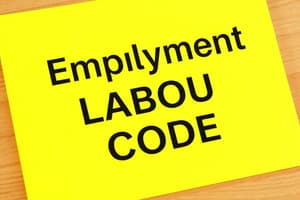Podcast
Questions and Answers
What is the role of a 'respondent' in the context of an appeal?
What is the role of a 'respondent' in the context of an appeal?
The 'respondent' is the party opposing an appeal of a previous decision.
Explain the jurisdiction of administrative tribunals in employment law.
Explain the jurisdiction of administrative tribunals in employment law.
Administrative tribunals have primary jurisdiction over most matters in employment law.
What must happen for a bill to become a statute in Canada?
What must happen for a bill to become a statute in Canada?
All bills require royal assent before they can become a statute.
What happens when there is a conflict between common law and statute law?
What happens when there is a conflict between common law and statute law?
Why are private members' bills considered rarely passed?
Why are private members' bills considered rarely passed?
Which employment laws apply to a grocery store worker in Lethbridge, Alberta?
Which employment laws apply to a grocery store worker in Lethbridge, Alberta?
What is the function of a privative clause in administrative law?
What is the function of a privative clause in administrative law?
What equality rights are guaranteed by Section 15 of the Canadian Charter of Rights and Freedoms?
What equality rights are guaranteed by Section 15 of the Canadian Charter of Rights and Freedoms?
What factors influence whether an organization in Canada is governed by provincial or federal employment laws?
What factors influence whether an organization in Canada is governed by provincial or federal employment laws?
Which type of law originates from the provincial legislature?
Which type of law originates from the provincial legislature?
In a legal context, how does a case from Alberta influence a judge in British Columbia if it covers the same issue?
In a legal context, how does a case from Alberta influence a judge in British Columbia if it covers the same issue?
What significant action did the Supreme Court take in Vriend v Alberta?
What significant action did the Supreme Court take in Vriend v Alberta?
In which circumstances may a statute law passed by the provincial legislature be overturned?
In which circumstances may a statute law passed by the provincial legislature be overturned?
What is the legal principle of stare decisis and why is it important in law?
What is the legal principle of stare decisis and why is it important in law?
Why might some tribunals be considered easier to deal with than traditional courts?
Why might some tribunals be considered easier to deal with than traditional courts?
What distinguishes tort law from contract law in the context of civil law?
What distinguishes tort law from contract law in the context of civil law?
What is the significance of the notwithstanding clause in the Canadian Charter of Rights and Freedoms?
What is the significance of the notwithstanding clause in the Canadian Charter of Rights and Freedoms?
How do general statutes differ from regulations in the legal system?
How do general statutes differ from regulations in the legal system?
What does it mean when a judge is appointed rather than elected in Canada?
What does it mean when a judge is appointed rather than elected in Canada?
When can legal action for dispute resolution only proceed in one specific forum?
When can legal action for dispute resolution only proceed in one specific forum?
What is the body of law dealing with serious employee misconduct leading to dismissal without notice?
What is the body of law dealing with serious employee misconduct leading to dismissal without notice?
What law is primarily created by judges in common law?
What law is primarily created by judges in common law?
What are the two key steps a provincial bill must complete to become a statute?
What are the two key steps a provincial bill must complete to become a statute?
In what situations does the Canadian Charter of Rights and Freedoms apply?
In what situations does the Canadian Charter of Rights and Freedoms apply?
What is the significant role of specialized tribunals and boards regarding employment statutes in Alberta and British Columbia?
What is the significant role of specialized tribunals and boards regarding employment statutes in Alberta and British Columbia?
What defines 'statute law'?
What defines 'statute law'?
How does the Canadian Charter of Rights and Freedoms empower individuals in the face of employment laws?
How does the Canadian Charter of Rights and Freedoms empower individuals in the face of employment laws?
What does the 'notwithstanding clause' allow the government to do?
What does the 'notwithstanding clause' allow the government to do?
What is the common perception of the non-union employment relationship within common law?
What is the common perception of the non-union employment relationship within common law?
Flashcards
Common Law
Common Law
Laws created by judges through decisions in court cases, setting precedents for future rulings.
Statute Law
Statute Law
A formal written law passed by a legislative body (like Parliament or Provincial Legislature).
Bill going to Committee
Bill going to Committee
A process where a bill is reviewed by a committee in the legislature before being considered for final approval.
Statute
Statute
A law that is passed by a legislature and receives Royal Assent, becoming a part of the official law of the land.
Signup and view all the flashcards
When does the Charter apply?
When does the Charter apply?
The Canadian Charter of Rights and Freedoms applies to actions by the government, not private individuals. It is a safeguard for individuals' rights.
Signup and view all the flashcards
Notwithstanding clause
Notwithstanding clause
A clause in the Charter that allows the government to override certain Charter rights to enact specific legislation.
Signup and view all the flashcards
Non-Union Employment Relationship
Non-Union Employment Relationship
The non-union employment relationship in Canada is primarily governed by contracts established between the employer and employee.
Signup and view all the flashcards
Charter's Supremacy
Charter's Supremacy
The Canadian Charter of Rights and Freedoms is part of the Canadian Constitution, making it the supreme law of the land and able to challenge other laws that violate its principles.
Signup and view all the flashcards
What does a privative clause do?
What does a privative clause do?
A privative clause aims to limit judicial review of administrative tribunal decisions. It attempts to keep these decisions within the tribunal's jurisdiction, reducing the likelihood of court intervention.
Signup and view all the flashcards
What employment laws apply in Lethbridge, Alberta?
What employment laws apply in Lethbridge, Alberta?
Provincial employment laws apply in Lethbridge, Alberta, as it is a provincial jurisdiction. Federal employment laws cover certain specific industries, like transportation or banking, regardless of location.
Signup and view all the flashcards
Where does statute law originate from?
Where does statute law originate from?
Statute law originates from provincial legislatures, reflecting decisions made by elected representatives. Regulations are detailed rules created by government bodies based on the powers granted by statutes.
Signup and view all the flashcards
What happened in the Vriend v Alberta case?
What happened in the Vriend v Alberta case?
In Vriend v Alberta, the Supreme Court expanded human rights protections by 'reading in' a category of people who were previously excluded. It used the Charter to ensure equality for a group initially left out.
Signup and view all the flashcards
What's significant about the R v Oakes case?
What's significant about the R v Oakes case?
In R v Oakes, the Supreme Court established a test to determine if a law is valid based on the Charter's guarantee of fundamental rights. The test balances individual rights with government interests.
Signup and view all the flashcards
What's persuasive precedent?
What's persuasive precedent?
Persuasive precedent is a legal decision from another jurisdiction that can be helpful but isn't binding. It provides guidance and may influence a judge, but it doesn't dictate the outcome.
Signup and view all the flashcards
What principle does Section 15 of the Canadian Charter of Rights and Freedoms guarantee?
What principle does Section 15 of the Canadian Charter of Rights and Freedoms guarantee?
The Canadian Charter of Rights and Freedoms guarantees equality rights for all people in Canada, protecting individuals against discrimination based on various grounds.
Signup and view all the flashcards
What determines whether federal or provincial employment laws apply?
What determines whether federal or provincial employment laws apply?
The jurisdiction, whether provincial or federal, that applies to your workplace depends on the industry sector your employer operates in. Think of it as specific industries being 'special cases.'
Signup and view all the flashcards
Royal Assent
Royal Assent
A bill becomes a statute (law) only after receiving royal assent, the formal approval from the monarch.
Signup and view all the flashcards
Administrative Tribunal's Jurisdiction
Administrative Tribunal's Jurisdiction
In Canadian employment law, administrative tribunals like the Human Rights Tribunal or Labour Relations Board have the primary authority to handle most matters.
Signup and view all the flashcards
Changing Regulations vs. Statutes
Changing Regulations vs. Statutes
A regulation is easier to amend than a statute because it doesn't go through the full legislative process. Regulations are created by the government.
Signup and view all the flashcards
Private Members' Bills
Private Members' Bills
Private members' bills, introduced by individual MPs, rarely become law as they face challenges in the legislative process.
Signup and view all the flashcards
Respondent in Appeal
Respondent in Appeal
The party opposing an appeal of a court's decision is called the respondent.
Signup and view all the flashcards
Stare decisis
Stare decisis
The principle that lower courts must follow the decisions of higher courts in similar cases.
Signup and view all the flashcards
Tort law
Tort law
A branch of law that deals with wrongs and damages caused by one person or company to another, outside of any contract.
Signup and view all the flashcards
Contract law
Contract law
The body of law that governs agreements between people or companies to buy or sell goods or services.
Signup and view all the flashcards
Judicial review
Judicial review
A type of legal action that seeks to have a court review the decision of an administrative tribunal.
Signup and view all the flashcards
Jurisdiction
Jurisdiction
The principle that courts and tribunals are limited to making decisions on matters within their specific area of authority.
Signup and view all the flashcards
Distinguishable decisions
Distinguishable decisions
Legal decisions that are similar to the current case, but can be distinguished on important facts, making them less persuasive.
Signup and view all the flashcards
Persuasive decision
Persuasive decision
A decision from a past case that is used by a judge as a persuasive argument for a ruling in a similar case.
Signup and view all the flashcards
Summary dismissal
Summary dismissal
The body of law that deals with serious employee misconduct that warrants immediate dismissal without notice.
Signup and view all the flashcardsStudy Notes
Employment Law Overview
- Canada Labour Code: Covers specific employers, like mining companies, but not book stores, banks, or hair salons.
- Common Law: Refers to laws established through judicial rulings, not legislative bodies.
- Statute Law: Laws passed by a legislature to become law.
- Statute Process: Provincial Bills must pass three readings in the provincial legislature and receive royal assent to become law.
- Canadian Charter of Rights and Freedoms: Applies when government action is involved or rights to equality are violated; doesn't cover all employment situations.
- Employment Statutes Enforcement: Primarily enforced by specialized tribunals and boards in Alberta and British Columbia; some cases also handled by superior courts.
- Bill Progression: Bills in provincial legislatures go to committee after second reading.
Additional Points
- Provincial Employment Legislation: Covers numerous people involved in the employment sector in Alberta and British Columbia, including judges and others who work for businesses
- Employment Contracts: In dispute cases, relevant cases from Alberta will be binding in BC courts.
- Charter of Rights Interpretation: In cases when a human right is being limited, the court uses a reasonable limits test to ensure the law is appropriate. Precedent (or stare decisis) is used to decide common law cases.
- Legal Proceedings: Courts have a specific jurisdiction and parties should avoid unnecessary court processes.
- Tort Law: Addresses wrongdoings and damages, not covered by contracts.
- Constitutional Law: The Canadian Charter of Rights and Freedoms is part of the Constitution.
- Different Legislation: If employee conduct affects provincial legislation, it's relevant; federal employee behavior is under a separate legal framework.
- Statute vs. Regulation: Federal and provincial governments can make laws, but regulations are more detailed than statutes.
Studying That Suits You
Use AI to generate personalized quizzes and flashcards to suit your learning preferences.




